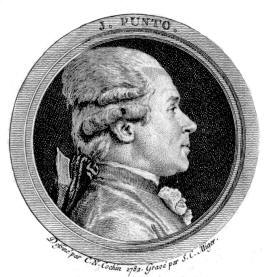For two centuries it was fashionable for composers to have Italian names. But fashion wasn’t the first thing on the mind of composer Jan Vaclav Stich when he changed his name. He wanted to avoid having his front teeth knocked out.
Stich was born in 1740 into a family of Czech peasants who lived on the estate of Count Joseph Johann von Thun. The boy was a talented violinist. But when it came to playing the horn, he was a standout. In fact, he was so good that Count von Thun sent him to Prague to study with the very best horn players available.
But the gifted young musician wasn’t entirely grateful. He was headstrong and independent. Soon after he returned to the service of the Count, he and four other musicians ran away. The Count flew into a rage, and sent his soldiers after the runaways with orders to knock out the horn player’s front teeth so that he’d never be able to play again. Jan Vaclav Stich kept one jump ahead of them, though, and escaped across the border in into the Holy Roman Empire. There, at the age of twenty, Jan Vaclav Stich became Giovanni Punto.
Stay informed on the latest news
Sign up for WPR’s email newsletter.
Within ten years Punto was famous as one of the best horn players in Europe. He played in the private orchestra of England’s King George the Third and in various court orchestras. He became so successful that in 1788 he made a concert tour of Germany in his own coach.
In Paris Punto met Mozart, who was so taken with his playing that he wrote a Sinfonia Concertante for him. In Vienna he met a young German composer who wrote a sonata that the two performed in Vienna and Budapest. After the Budapest performance a music critic wrote of the pianist-composer, “His name is not well-known in music circles,” then he added, “Of course, Punto is very well-known.”
But soon the young pianist-composer would become a good deal better known than the hornist who had changed his name to save his teeth. His name was Ludwig van Beethoven.
Wisconsin Public Radio, © Copyright 2025, Board of Regents of the University of Wisconsin System and Wisconsin Educational Communications Board.





